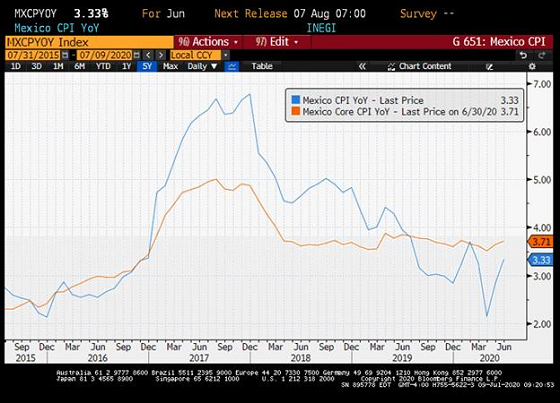By Natalia Gurushina, Chief Economist, Emerging Markets Fixed Income Strategy, VanEck Global
Mexico’s inflation was boosted by the COVID-related supply shocks. China’s inflation also edged up, but the uptick was small and localized.
Mexico is quickly becoming a poster kid for supply-side inflation shocks in Emerging Markets (EM). June’s headline inflation rose more than expected (3.33% year-on-year), with a noticeable acceleration in the second half of the month. Yearly core inflation followed the same pattern, rising to 3.71% (see chart below). The impact of the coronavirus on supply chains offset the disinflationary impact of weaker domestic demand, and this is likely to push prices higher in the coming months. A good thing is that inflation still remains within the central bank’s target range, which should pave the way for additional monetary easing – even though we expect the central bank to remain cautious. As of yesterday, the market was expecting 100bps of rate cuts in Mexico in the next six months.
China’s inflation also surprised to the upside in June, but the uptick was relatively small and “localized”. Monthly inflation reflected higher food prices, which were driven by a rebound in pork prices and by the impact of floods on certain grains. Everything else remained pretty much “dormant” – in line with still subdued domestic activity. As regards less negative producer prices, a changing base effect played a role, together with higher global commodity prices (oil) and the resumption of investment activity. Today’s releases should have a limited impact on China’s monetary policy, which we expect to remain measured and targeted.
The pension reform rollback in LATAM just got worse. Chile’s lower house approved a bill that allows withdrawals from private pension accounts. So, it looks like Chile is following in the footsteps of Peru, which made a similar decision earlier this year (Mexico and Colombia are contemplating changes as well). Longer-term, the move can put more pressure on the government’s fiscal accounts. A more immediate risk is related to local financial markets. Chilean pension funds’ assets are very substantial – about 70% of the country’s GDP – with about 60% of that amount invested domestically. Liquidating some of these holdings in order to raise cash can adversely affect asset prices.
Chart at a Glance: Mexico Inflation – Supply Shocks Are Showing Up

Source: Bloomberg LP
IMPORTANT DEFINITIONS & DISCLOSURES
PMI – Purchasing Managers’ Index: economic indicators derived from monthly surveys of private sector companies; ISM – Institute for Supply Management PMI: ISM releases an index based on more than 400 purchasing and supply managers surveys; both in the manufacturing and non-manufacturing industries; CPI – Consumer Price Index: an index of the variation in prices paid by typical consumers for retail goods and other items; PPI – Producer Price Index: a family of indexes that measures the average change in selling prices received by domestic producers of goods and services over time; PCE inflation – Personal Consumption Expenditures Price Index: one measure of U.S. inflation, tracking the change in prices of goods and services purchased by consumers throughout the economy; MSCI – Morgan Stanley Capital International: an American provider of equity, fixed income, hedge fund stock market indexes, and equity portfolio analysis tools; VIX – CBOE Volatility Index: an index created by the Chicago Board Options Exchange (CBOE), which shows the market’s expectation of 30-day volatility. It is constructed using the implied volatilities on S&P 500 index options.; GBI-EM – JP Morgan’s Government Bond Index – Emerging Markets: comprehensive emerging market debt benchmarks that track local currency bonds issued by Emerging market governments.; EMBI – JP Morgan’s Emerging Market Bond Index: JP Morgan’s index of dollar-denominated sovereign bonds issued by a selection of emerging market countries; EMBIG – JP Morgan’s Emerging Market Bond Index Global: tracks total returns for traded external debt instruments in emerging markets.
The information presented does not involve the rendering of personalized investment, financial, legal, or tax advice. This is not an offer to buy or sell, or a solicitation of any offer to buy or sell any of the securities mentioned herein. Certain statements contained herein may constitute projections, forecasts and other forward looking statements, which do not reflect actual results. Certain information may be provided by third-party sources and, although believed to be reliable, it has not been independently verified and its accuracy or completeness cannot be guaranteed. Any opinions, projections, forecasts, and forward-looking statements presented herein are valid as the date of this communication and are subject to change.
Investing in international markets carries risks such as currency fluctuation, regulatory risks, economic and political instability. Emerging markets involve heightened risks related to the same factors as well as increased volatility, lower trading volume, and less liquidity. Emerging markets can have greater custodial and operational risks, and less developed legal and accounting systems than developed markets.
All investing is subject to risk, including the possible loss of the money you invest. As with any investment strategy, there is no guarantee that investment objectives will be met and investors may lose money. Diversification does not ensure a profit or protect against a loss in a declining market. Past performance is no guarantee of future performance.







